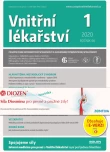Treatment of arterial hypertension in metabolic syndrome
Authors:
Barbora Nussbaumerová
Authors‘ workplace:
2. interní klinika Fakultní nemocnice Plzeň
; Centrum preventivní kardiologie, Univerzita Karlova, Lékařská fakulta v Plzni
Published in:
Vnitř Lék 2020; 66(1): 10-14
Category:
Main Topic
Overview
High-normal blood pressure/arterial hypertension is one of the diagnostic criteria of metabolic syndrome. Metabolic syndrome is connected with an increased cardiometabolic risk. The cornerstone of treatment is lifestyle intervention. Pharmacotherapy is iniciated with ACE inhibitors/angiotensin receptor blockers and calcium chanel blockers or diuretic according to current guidelines.
Keywords:
arterial hypertension – metabolic syndrome – pharmacotherapy – lifestyle intervention – target values
Sources
1. Alberti KG, Eckel RH, Grundy SM et al. Harmonizing the Metabolic Syndrome: a Joint Interim Statement of the International Diabetes Federation Task Force on Epidemiology and Prevention; National Heart, Lung, and Blood Institute; American Heart Association; World Heart Federation; International Atherosclerosis Society; and International Association for the Study of Obesity. Circulation 2009; 120: 1640–1645.
2. Cífková R, Bruthans J, Adámková V, et al. Prevalence základních kardiovaskulárních rizikových faktorů v české populaci v letech 2006–2009. Studie Czech postMONICA. Cor Vasa 2011; 53: 220–229.
3. Rosolová H. Metabolický syndrom a jeho význam v primární prevenci nemocí s častým výskytem v populaci. Cor Vasa 2011; 53: 249–252.
4. Hamet P, Merlo E, Šeda O et al. Quantitative Founder‑Effect Analysis of French Canadian Families Identifies Specific Loci Contributing to Metabolic Phenotypes of Hypertension. Am J Hum Genet 2005; 76: 815–832.
5. Reaven GM, Lithell L, Landsberg L. Hypertension and associated metabolic abnormalities – the role of insulin resistance and the sympathoadrenal system. N Engl J Med 1996; 334: 374–381.
6. The Task Force for the management of arterial hypertension of the European Socie‑ ty of Cardiology (ESC) and the European Society of Hypertension (ESH). 2018 ESC/ESH Guidelines for the management of arterial hypertension. European Heart Journal (2018) 39, 3021–3104 doi:10.1093/eurheartj/ehy339.
7. Stevens VJ, Obarzanek E, Cook NR et al. Trials for the Hypertension Prevention Research G. Long term weight loss and changes in blood pressure: results of the Trials of Hypertension Prevention, phase II. Ann Intern Med 2001; 134: 1–11.
8. Elliott P, Stamler J, Nichols R et al. Intersalt revisited: further analyses of 24 hour sodium excretion and blood pressure within and across populations. Intersalt Cooperative Rese‑ arch Group. BMJ 1996; 312: 1249–1253.
9. Widimský J, Filipovský J, Ceral J et al. Doporučení pro diagnostiku a léčbu arteriální hypertenze ČSH 2017. Hypertenze, kardiovaskulární prevence 2018; 7 (Supplementum): 1-20.
10. Bakris G, Molitch M, Hewkin A et al.: Differences in glucose tolerance between fixed‑dose antihypertensive drug combinations in people with metabolic syndrome. Diabetes Care 2006; 29: 2592–2597.
11. Egan BM, Bandyopadhyay D, Shaftman SR et al. Initial monotherapy and combination therapy and hypertension control the first year. Hypertension 2012; 59: 1124–1131.
12. Corrao G, Parodi A, Zambon A, et al. Reduced discontinuation of antihypertensive treatment by two‑drug combination as first step. Evidence from daily life practice. J Hypertens 2010; 28: 1584–1590.
13. Conn VS, Ruppar TM, Chase JA et al. Interventions to improve medication adherence in hypertensive patients: systematic review and meta‑analysis. Curr Hypertens Rep 2015;17: 94.
14. Mancia G, Rea F, Cuspidi C et al. Blood pressure control in hypertension. Pros and cons of available treatment strategies. J Hypertens 2017; 35: 225–233.
15. The SPRINT Research Group. A Randomized Trial of Intensive versus Standard Blood‑Pressure Control. N Engl J Med 2015; 373:2103-2116 DOI: 10.1056/NEJMoa1511939
Labels
Diabetology Endocrinology Internal medicineArticle was published in
Internal Medicine

2020 Issue 1
Most read in this issue
- Sarcopenic obesity – current view
- Chronic stress, mental discomfort, and depression increase the rates of infectious, autoimmune as well as malignant diseases
- Odešel velký člověk a lékař prof. MUDr. Vítězslav Kolek, DrSc., FCCP
- Mandibular pain and deformation as a presentation of fibrous dysplasia of the mandible
